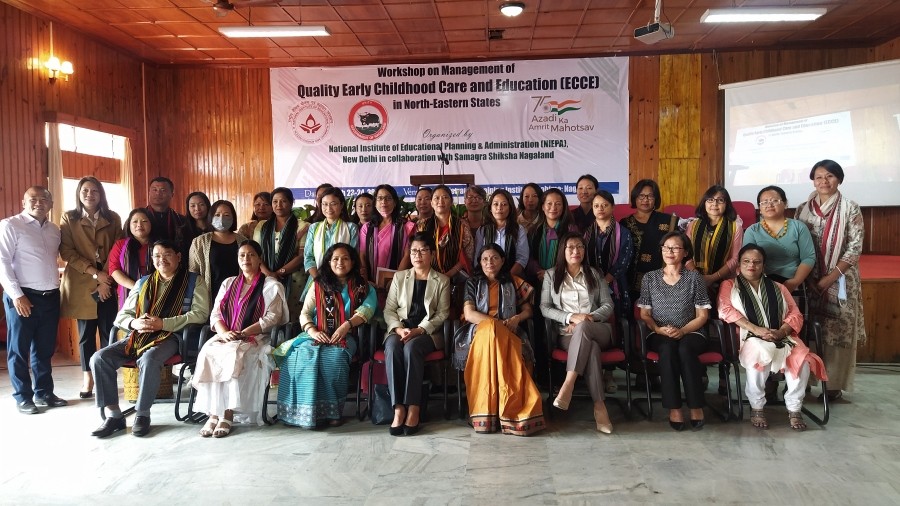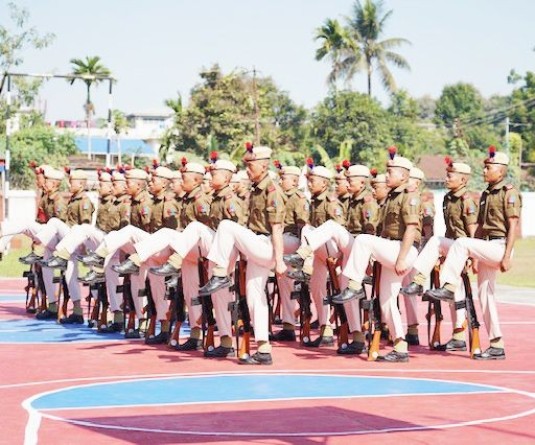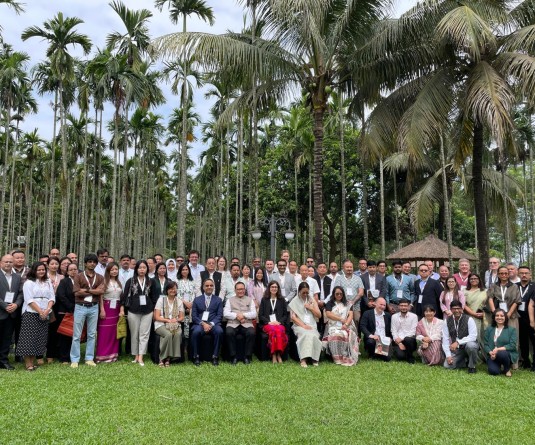Participants during the inaugural of the workshop at ATI Kohima on March 23. (Morung Photo)

Morung Express News
Kohima | March 23
Nagaland state has the highest proportion of enrolment in pre-primary classes in the country with more than 97% of pre-primary classes within the primary government schools and 50% total enrolment accounting for enrolment in pre-primary classes. There are 2506 schools with pre-primary in the state with 81579 students which is inclusive of both government and private schools. The government sector accounts for 1773 schools with a total of 38519 students.
These were revealed during the inaugural programme of the two day workshop on management of Quality Early Childhood Care and Education (ECCE) in North-Eastern States that got underway here today at the Administrative Training Institute (ATI), Kohima. Addressing the inaugural session, Kevileno Angami, Commissioner & Secretary for School Education and SCERT said all schools in Nagaland having primary section are attached with pre-primary by default, which are popularly known as Class A and B.
Pointing out that all schools under the administration of department of School Education and NBSE start with Class A and B, she noted that the concept of nursery class and play schools have started in some private schools only in recent years.
Under the provision of the RTE Act, the financial support and guidance from Government of India pertains only to children starting from Class 1 onward. However, the state caters to children in pre-primary as well i.e., Class A and B wherein children in pre-primary in government schools are covered whether it is provision of classrooms and other facilities, primary teachers, uniforms, textbooks and midday meal, she highlighted.
She further stated that SCERT has pioneered in developing ECCE material for the state and ECCE based text books developed by SCERT are used for the pre-primary children. She however impressed upon that there is still a long way to go to reach the desired level of delivering quality ECCE.
Observing that numeracy, maths and science phobia is common in most children in the state, she said that “such phobia in children is because of preconceived notions and poor foundation in understanding of numeracy in the early stages of learning.”
In this regard, she pointed out that “quality of facilities provided, standard of learning material and assessment, the lack of trained competent and child friendly quality teaching, learning transactions are not up to the standard in most schools and we have a long way to go.”
Emphasising that new learning have to be acquired and put into practice along with unlearning of undesired knowledge and practices, she asserted that “laying of a firm and solid foundation is critical to education” while pointing out that the early years are foundation for future learning.
“The ability to comprehend and understand numeracy in early stages will go a long way in making children move away from rote learning which has been the practice in many children in the state and across the country,” she stated. This, she added, will pave the way for making learning joyful.
She further impressed upon that the NEP (National Education Policy) 2020 has given new lease of life to EECCE and foundational literacy and numeracy with the mandate given to ensure that all children up to six years are provided integrated services for holistic development, attain grade level competencies in reading, writing and numeracy for children in age group of 3 to 9 years.
Towards this end, she said, “the onus is on all the stakeholders, departments, educationists, educators, administrators, subject experts, teachers to create an enabling environment, development of quality resources/learning material and providing access to ensure universal acquisition of foundational literacy and numeracy for children in the country so that the goals are achieved and 100 per cent enrolment in pre-school by 2030 is attained as envisaged in the NEP 2020.”
“There is need for expert guidance and inputs. We can learn from each other, share best practices relating to management of different types of EECCE models,” she added. She also expressed confidence that the two day workshop will provide insights into the gaps and bridge the gaps in the way of management of quality ECCE for the benefit of all children in the country to give them the best start in life.
Highlights of the inaugural programme included welcome and programme highlights by Prof. Rasmita Das Swain, School and Non-Formal Education, NIEPA, opening remark by Prof. Pranati Panda, Head, School and Non-Formal Education, NIEPA, and introduction of participants from different states of North Eastern. State Project Director, Samagra Shiksha, Temsunaro Aier and Director for SCERT, Chumchanbeni Kikon also spoke on the occasion.






